Brazilian Cattle Industry Forges Unique Relationship with U.S. Experts
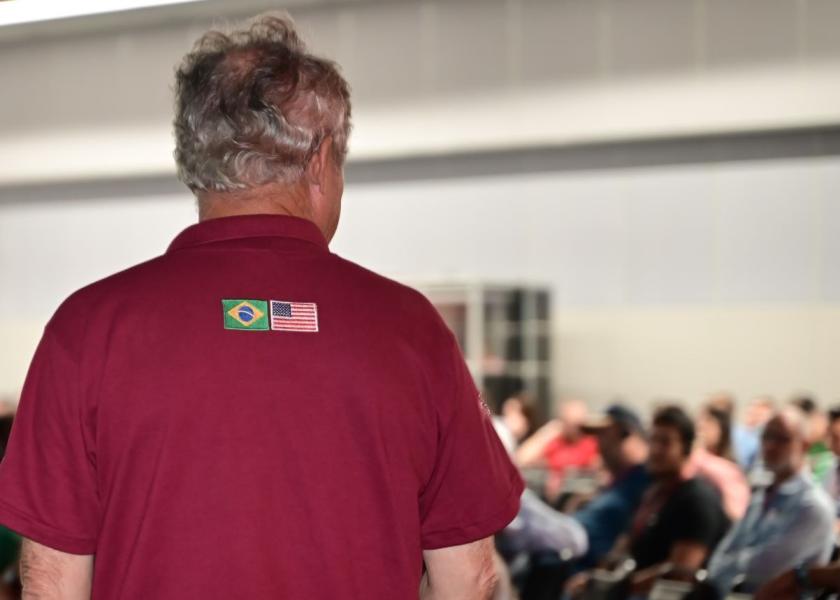
Farm Journal’s PORK editor Jennifer Shike recently traveled to Brazil with her husband, Dan Shike, professor of animal science at the University of Illinois. Dan was part of the line-up of speakers presenting at the New Concepts on Bovine Production and Reproduction conference in Uberlandia. Although she did find some time to relax in the sun, she couldn’t resist sharing the unique approach behind this conference and the story of its creator who has forever impacted the beef and dairy industries in Brazil.
Some say he’s single-handedly changed the Brazilian beef industry. Others say he’s changed their life. No matter how you look at it, Professor Zequinha is a game-changer. Although he’d never admit it, it’s because of his leadership and mentoring that hundreds of São Paulo State University students have gone on to find their unique place in the beef and dairy industries finding ways to produce more meat and milk to feed a growing world population.
Establishing a one-of-a-kind model
In 1993, Dr. Jose Luiz Moraes Vasconcelos, affectionately known as Zequinha, and a group of his students formed an agricultural consulting company called Conapec Junior to provide students at UNESP São Paulo State University at Botucatu more hands-on learning experiences.
Conapec Junior serves as an outreach arm in Brazil, similar to Extension in the United States, with a goal of providing additional education and resources for beef and dairy cattle producers. Along the way transformative experiences occur for his students, launching them into futures beyond their wildest imaginations.
“Conapec Junior started as a way to help students get real-life exposure to working on a farm,” says Zequinha, retired professor and DVM at São Paulo State. “Then, it evolved into so much more.”
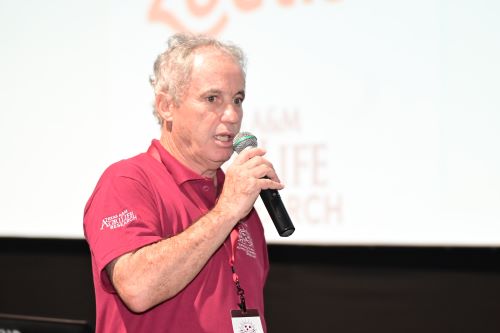
Jose Luiz Moraes Vasconcelos has helped revolutionize the cattle industry in Brazil through his work at UNESP São Paulo State University. Photos by Texas AgriLife Research.
Zequinha joined the faculty of the Department of Animal Science at São Paulo State University in 1989 and has authored or co-authored 108 peer-reviewed journal articles in beef and dairy cattle production. His research has developed strategies to improve fertility in beef and dairy cattle with the use of biotechnologies such as timed artificial insemination and embryo transfer.
In addition to his extensive research program, Zequinha’s impact is most recognized through the annual conference that he and his students in Conapec Junior have organized each year (except 2020 and 2021 due to COVID-19) since Conapec Junior was formed. This conference – New Concepts on Bovine Production and Reproduction – is one of the largest beef and dairy cattle conferences in the world designed to showcase the latest technologies in cattle nutrition, health, and reproduction, with a record-breaking 2,200 producers, veterinarians, nutritionists, industry professionals, and students in attendance in 2024.
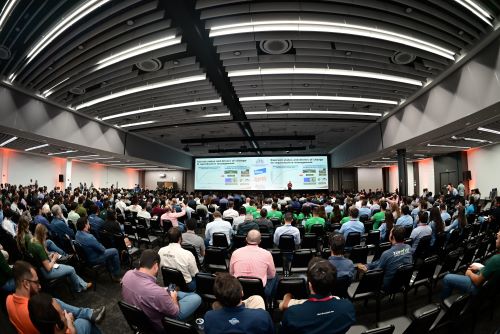
Attendance had to be capped at this year's record-breaking conference in March.
The sessions are simultaneously translated and bring in a variety of speakers, including scientists from 11 universities or research institutions in the United States and beyond. More than 100 invited scientists have presented their research findings to improve beef and dairy cattle production. The 2024 conference included experts from Michigan State University, University of Florida, University of Wisconsin, Iowa State University, Cornell University, University of British Columbia, Texas A&M University, University of Illinois, Kansas State University, Virginia Tech University and South Dakota State University.
The 2024 event added a unique twist as Texas A&M AgriLife Research led the organization of this conference for the first time. Reinaldo Fernandes Cooke, the Burkhart Endowed Professor for Beef Cattle Research in the Department of Animal Sciences at Texas A&M University, led the efforts to organize this event. As a former student of Zequinha, Cooke says the opportunity to partner in this conference with him means a lot to him.
“Zequinha was my undergraduate advisor, and still serves as a mentor. I’m happy to help continue his legacy. His influence over the Brazilian dairy and beef industries is unique and exposes his mentees to unique opportunities including meeting with key industry personnel during the conference and working directly with international scientists during and after the conference,” Cooke says.
Advancing food security around the globe
Cooke says this ties in well to his role at Texas A&M AgriLife Research where he is focused on developing international academic programs, including research efforts and educational activities.
“Brazil has the largest commercial cattle population in the world; therefore, any advances in the Brazilian beef industry will contribute to beef/dairy production and food security worldwide,” Cooke says.
For more than 20 years, G. Cliff Lamb, director of Texas A&M AgriLife Research, has participated and presented at this conference. With the many demands on his schedule, he notes this one has remained a priority for many reasons.
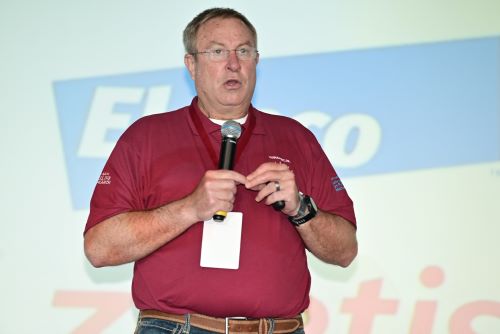
Cliff Lamb has presented at more than 20 conferences organized by Conapec Junior. Photo by Texas AgriLife Research.
“This conference undoubtedly has a major impact on beef and dairy cattle management in Brazil and other parts of the world,” Lamb says. “It is evident that Zequinha’s achievements reflect a benchmark Extension program that should serve as a model for institutions and Extension professionals in Brazil and the U.S.”
Speakers present on relevant information that can be immediately adopted by producers throughout Brazil.
“It is encouraging to know that science that we work on will be adopted. Over the years, I have seen significant adoption of the scientific discoveries that we have made,” Lamb says.
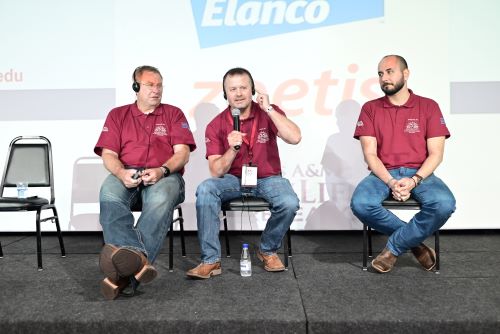
U.S. speakers wear headsets during a panel so translators can help relay questions from the audience. L to r: Lamb, Dan Shike of the University of Illinois and Vitor Mercadante of Virginia Tech.
But there’s no question the speakers take a lot back with them to their research programs and institutions.
“Every time I go back I learn more about the changes in the Brazilian cattle industry,” Lamb says. “I have witnessed adoption of technology at an accelerating rate, yet there seems to be a hunger for new knowledge and technology that they want to adopt. I come away feeling that the work we do is recognized and valued.”
Building industry leaders
In addition to bringing in new technologies, the conference has become a focus point for networking among professionals, producers, students and scientists from Brazil and international institutions. Since January 2000, when Zequinha’s first students came to the University of Wisconsin, more than 100 students have enrolled in U.S. universities as graduate students or research interns. At least 10 of these students became faculty members at universities in the United States.
More than 100 of these students are now working in Brazil in food animal production either in the private sector or have established their own consulting firms to provide services in cattle management. Three of these students formed the Lageado consulting company, the largest provider of timed AI services in Brazil, with more than 25 employees inseminating over 250,000 cows timed AI per year.
Perhaps what makes this conference so special is the networking opportunities it affords for lifelong connections and job opportunities between the students, speakers, industry leaders and beef and dairy producers.
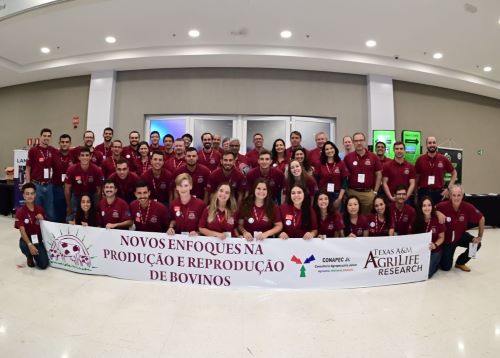
Students and speakers at the 2024 conference.
“The conference is co-organized by students. Working to enhance opportunities for these students who will later become global leaders is a motivation for me,” Lamb says. “In fact, my research program has benefitted from training many of the students who have worked in the program. Those that I have trained have ultimately completed graduate degrees in my program and have become leaders themselves.”
A true game-changer
The conference is now regarded as the key conference for individuals who adopt technology in cattle operations in Brazil, Lamb points out. In fact, Zequinha predicts that more than 75% of the adoption of reproductive technologies have been adopted by veterinarians or producers who have attended at least one of these conferences.
Zequinha says his goal for organizing a conference of this magnitude is simple: He wants his students to realize they can do it. He wants to help them build their confidence and be proud of what they have accomplished. When it’s all said and done, he hopes the conference can make the students, speakers, and attendees happy.
“He has a passion for the success of the future generation of scientists. He initiated the conference by recognizing a gap in knowledge and introducing a concept to deliver knowledge to a large portion of the Brazilian population who would adopt new technology,” Lamb says.
Zequinha has had a significant impact across the world, Lamb adds. By creating opportunities for his mentees to study throughout the world, he has positioned them to become global leaders.
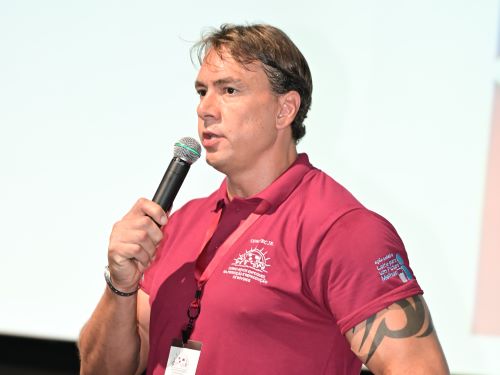
Reinaldo Cooke welcomes attendees to the conference.
That’s Cooke’s story. Because of Zequinha’s impact and the opportunities he provided, Cooke went to the University of Florida for his Ph.D. with John Arthington. He met Lamb at the 2003 conference and Lamb later served on his Ph.D. committee. Today Lamb and Cooke and colleagues and are working together to fuel this unique approach to education for years to come.
“We plan to continue this role partnering in the conference for the long term,” Cooke explains. “This is the most important and influential cattle conference in all of South America, which is directly aligned with Texas A&M AgriLife Research goal in expanding educational efforts across borders.”
Read More:
Barn Hero Summer Doty: Prioritizing Pig Care
How Ranchers can Feel More Energized and Reduce their Aches and Pains
Built Out of Love: How Two Sisters Created a Super-Fast-Growing Yogurt Company







